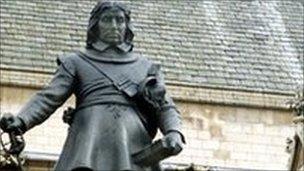Roundheads and republicans
- Published
- comments

Oliver Cromwell is often viewed as revolutionary republican
The Cambridge college I attended wouldn't be the first tourists stop at when seeing the sights.
But Sidney Sussex college does have at least one claim to fame - or in an Irish context, infamy.
It was the alma mater of Oliver Cromwell, who left without graduating in 1617.
He went on to become the victor of the English civil war, a prime mover in the execution of Charles I and, eventually, the lord high protector who ordered the massacre of thousands of people at Drogheda and Wexford.
Cromwell died of natural causes in 1658, but less than three years later, after the monarchy was restored, his body was exhumed.
He was posthumously executed and his severed head mounted on a spike as a warning to anyone else who might be contemplating treason.
The head fell off the spike during a storm, was passed around as a curio over the centuries, until in 1960s the student returned to his old college.
The lord protector's skull is now buried under the Sidney Sussex college chapel.
In this week steeped in history and symbolism (the "S" word again), I recall this as an illustration of the often haphazard course of events.
These days we use "republican" as a synonym for "Irish nationalist" - normally someone on the more fervent end of the spectrum.
The IRA used to boast about attacking the "crown forces". Loyalists are so described because they claim to be loyal to the crown.
It's precisely because the monarch is so tied up with the culture and terminology of the conflict that this trip has proved so fascinating.
In this context, less appears to mean more - a few words from the Queen pack a greater punch than a lengthy diatribe from a prime minister.
The current lexicon has held for the past 100 years.
But it might not have been that way. Cromwell is often described as a republican revolutionary, even though his regime tended more towards a dictatorship than the kind of democratic presidential republics we think of these days.
When he sacked Drogheda, the town was being defended by English royalists and Irish confederates. A Protestant republican massacred Catholic monarchists.
If the English protectorate had lasted we might have been talking about a monarchist insurgency against republican imperialism.
If one of Cromwell's commanders, General Monck, had not invited Charles II to resume the throne, then who knows where we would be now?
When the Battle of the Boyne took place in 1690, both sides were monarchists, albeit signed up to different kings.
However, the association of Irish nationalism with the restoration of the Jacobite monarchy faded after the defeats at Aughrim and the Boyne, slowly becoming extinct during the eighteenth century.
When Wolfe Tone came along, he took his inspiration from the republicans of the French revolution, not the descendants of James II and Bonnie Prince Charlie.
Counter-factual history is, of course, a fun parlour game but largely pointless (What if Henry VIII's first wife had given him a healthy boy?).
However, it does serve to emphasise that the passage of historic events, in Ireland as elsewhere, was not inevitable (What if Wolfe Tone had followed an alleged early inclination to go off and colonise Hawaii on behalf of the British?).
So equally - and here we return at long last to the Queen's speech - the future is not set in stone we all hold its making in our hands.
But just think of this - what if Jacobitism had triumphed and the line of descent had passed on through Franz, Duke of Bavaria (currently unmarried and without a son) and thence to his brother Prince Max (also without heirs) and finally to his second cousin, Prince Luitpold of Bavaria, chief executive of the very fine Konig Ludwig Schlossbrauerei, brewers of "Beer of Royal Highness"?
I should wager that, in these circumstances, that pint of Guinness would not have remained unsipped.
PS. Whilst accepting the Queen's expression of sincere sympathy as genuine, Gerry Adams criticised her characterisation of the relationship between Britain and Ireland as "not entirely benign", calling it "a gross understatement".
True, but isn't understatement often more powerful than exaggeration?
I have always been drawn, for example, to the Captain Oates' style ("I am just going outside and may be some time").
Any views out there on understatement, and /or examples of its use or misuse?